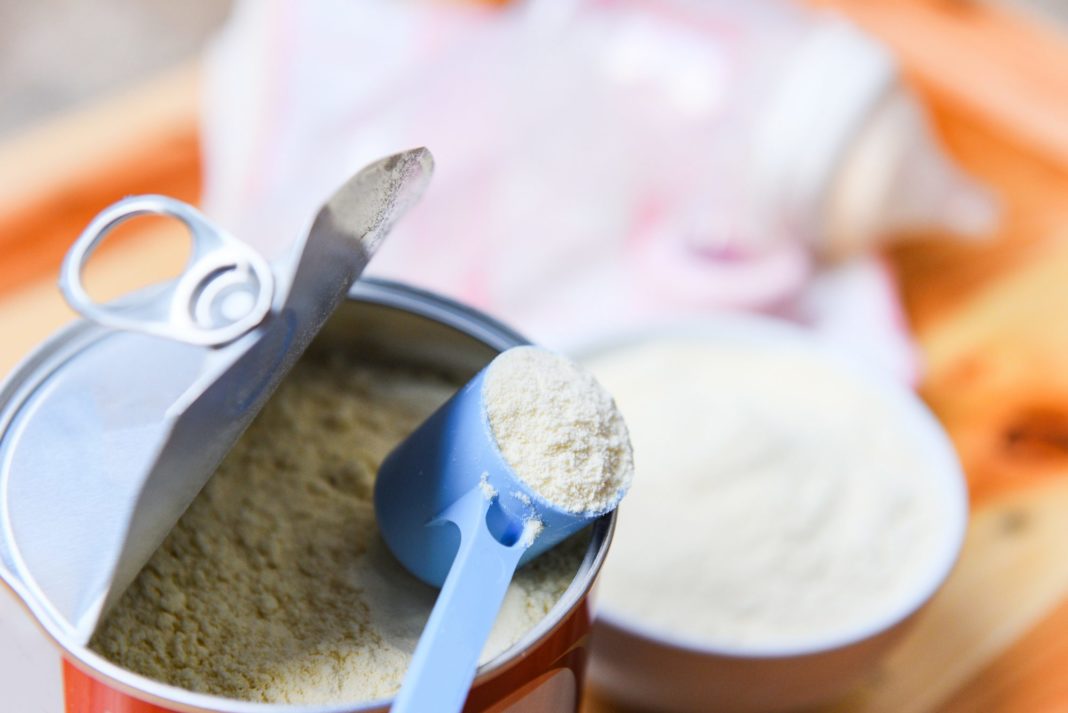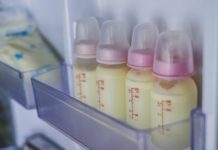
Melissa Carr was 5 when her mother was diagnosed with breast cancer and 20 when she died. Because of her family history, Carr's doctor referred her for genetic counseling. She tested positive for the breast cancer gene 2 mutation or the BRCA2 mutation. Doctors told her she had an 87 percent chance of developing breast cancer during her lifetime.
Carr had a lot of living to do, including dreams of one day being a mother. In 2017, she had a mastectomy to reduce her chances of developing breast cancer.
"I was like, 'Take them. I don't need my girls,'" Carr says. "If you were to find out that you were going to board a flight today and it had an 87 percent chance of going down, would you still board your flight?… That was my reality."
Another reality: Carr would not be able to breastfeed when she had her son in March 2020. And she wouldn't be receiving any assistance from her insurance company to feed her child. That's a stark contrast from families with lactating individuals who can receive a free breast pump under the Affordable Care Act. Since it was enacted in 2010, research shows there's been an 11-fold rise in breast pump claims.
On the other hand, Carr says she and her husband shelled out $142 per month on infant formula—that's $1,704 for her son's first year. "Moms who can breastfeed don't have that formula expense cost," Carr says. "It does make things cheaper the first year of life. We're in a blessed position where money isn't a huge hurdle. For those who it is, I feel awful for them. If I was a single mom, I can't imagine."
Purchasing donor milk would have cost even more. The American Academy of Pediatrics (AAP) estimates it costs about $3 to $5 per ounce. Babies often drink around 28 to 32 ounces of milk or formula per day. Parents who purchase donor milk can spend about $84 to $160 for just 24 hours' worth of feeding, or $30,660 to $58,400 per year. (The FDA advises against peer-to-peer sharing of free donor breastmilk, as it is unscreened, may be contaminated, and could expose the infant to HIV.)
A new petition is calling for a change to insurance policies so that individuals who received mastectomies can get coverage for donor milk or formula. Started by Bobbie, the only female-founded and mom-led infant formula company in the U.S., and the non-profit organization, The Breasties, it currently has more than 3,000 signatures.
One infant feeding expert thinks the petition's request is valid.
"All infants need to eat, and if their parent had a mastectomy they cannot feed their baby from their body, donor milk or infant formula are the only safe options for feeding infants and must be covered to ensure the safe feeding of newborns," says Jada Shapiro, CLSC, lactation expert and founder of Boober, a platform which quickly matches parents to lactation support.
But will the petition move the needle? Experts weighed in on what help is currently available to families without a lactating person and why changes to insurance policies are difficult to achieve.
How Can Families Receive Financial Assistance For Formula?
Insurance will cover some formula, but it's typically tied to what insurance companies consider a medical necessity to the baby. What does this mean in the eyes of insurance companies?
"[Insurance will at least partially cover formula for] children who develop an intolerance to formula and need an extensively hydrolyzed formula," says Christie del Castillo-Hegyi, M.D., a board-certified emergency physician, newborn brain injury and breastfeeding complications researcher, and the co-founder of the Fed Is Best Foundation.
For example, infants with dairy intolerances, galactosemia, and congenital metabolic disorders typically qualify for this type of formula. It requires a prescription from a health care provider.
But Dr. Castillo-Hegyi says it doesn't take into account that nutrition is a medical necessity for infants, whether they have an intolerance to standard formula or not. What's more, she says it ignores parents' medical realities, such as the inability to breastfeed after a mastectomy, and same-sex male couples, adoptive parents, and foster parents. "If we are creating a policy that inadvertently isn't inclusive, it's not a policy that supports long-term infant health," says Dr. Castillo-Hegyi.
Coverage for donated human milk is even rarer. But recently, in Illinois, a new law enabled parents who cannot produce human milk and whose infants are born prematurely or critically to receive insurance coverage for donated human milk.
Parents who have access to SNAP benefits can use those to pay for infant formula—if they qualify. Same for WIC, but that process is often more complicated.
"Each state decides through a bidding process which companies will supply the formula," says Dr. Castillo-Hegyi. "It's often one brand and not always 100 percent covered."
Conceivably, a child may dislike and refuse to drink Formula Brand A and gulp down Formula Brand B. But if the state has a deal with Formula Brand A, the caregiver will be on their own to purchase it, Dr. Castillo-Hegyi notes.
Carr did not qualify for WIC or SNAP benefits, and she knows some people miss qualifying for either by a couple of dollars. She says people often suggest clipping coupons for formula or asking for them in the mail. "Those $5 coupons in the mail don't help," Carr says.
Why Is There a Gap in Coverage?
The reasons for the differences in coverage for breast pumps versus formula and human milk are complicated and multi-faceted. Here are the most pressing ones.
Financial
Dr. Castillo-Hegyi concedes that part of the reason families can get a free breast pump but not free formula is likely financial.
Breast pumps usually cost between $50-$400. Even the more expensive pumps are a fraction of the cost of formula. But Dr. Castillo-Hegyi doesn't think that's an excuse to not provide families without a lactating individual with no financial assistance.
"It would seem reasonable since you pay for insurance there should be an alternative option for someone who cannot use a breast pump," adds Dr. Castillo-Hegyi. "What if you used that same money and let them put it towards a few months of infant formula?"
The idea that “Breast is Best”
Dr. Castillo-Hegyi says part of the problem is how society and medical professionals have sold breastmilk as a far superior option. The AAP recommends exclusive breastfeeding for six months with continued breastfeeding along with complementary solids for at least a year. The World Health Organization (WHO) recommends exclusive breastfeeding for six months and breastfeeding with the introduction of complementary solids for up to two years. Both organizations, along with breastfeeding advocates, point to greater benefits for the mother, including a reduced risk of some cancers, and the baby, such as more protection from certain illnesses and diseases and even higher IQ.
While breastfeeding can be a wonderful experience for a parent and child, the data on other purported benefits is murkier. A 2001 study of infant health found that breastfed infants were less likely to experience gastrointestinal infections or eczema but found no significant difference in respiratory infections between breastfed or formula-fed children. Sibling comparisons did not find a significant difference in IQ.
In other words, Dr. Castillo-Hegyi agrees breastfeeding can be great—if it's possible and works out. But it's not always the case, and babies who drink formula can be perfectly healthy as long as they're safely and adequately fed. But all families need support to give their infants vital nutrients, and they're not getting it.
"The way the status quo is now is we address one type of feeding, one type of mom, one type of life situation," Dr. Castillo-Hegyi says. "We're excluding millions of families and babies whose lives depend on an inclusive infant feeding policy and message. The neglect is harmful…All of these children require solid nutrition to have the best outcomes."
Lobbying
To get an item included in a bill, someone needs to lobby Congress for it. Exactly who lobbied for access to free breast pumps under the ACA is unclear. Courtney Jung, author of Lactivism: How Feminists and Fundamentalists, Hippies and Yuppies, and Physicians and Politicians Made Breastfeeding Big Business and Bad Policy, once asked Stephen Brill, who authored a book on the political and economic interests involved in the Affordable Care Act, if he knew.
According to a passage of her book published in The Atlantic, "When I asked him about how free breast pumps had made it into the legislation, he said he had not heard specifically of a breast-pump manufacturers' lobby, but he would be surprised if they didn't have one."
Dr. Castillo-Hegyi agrees: "Someone, in the process of putting together the Affordable Care Act, advocated for free breast pumps, which is great."
At some point, she says Fed Is Best would love to do something similar to provide support for all families in feeding their infants. But right now, the foundation is working on chipping away at the "breast is best" messaging, where families often get little advice on formula feeding other than to "read the can" in hospitals. The foundation is working on a manual for all types of infant feeding, including nursing, pumping, formula feeding, and tube feeding. She hopes it helps change the conversation, provides more inclusive support for families, and, ultimately, leads to a broader movement reflected in policies.
What Can Parents Do?
The petition contains valid requests and signing it can raise awareness, Dr. Castillo-Hegyi says. But she says it's unlikely to change insurance policies, at least in the short-term. So, what can parents without a lactating person do to create change?
"It's a hard one," she admits. "Change requires lobbying."
But parents who aren't lobbyists or don't have deep ties to Congress aren't out of luck. Shapiro suggests speaking with local politicians about concerns and calling insurance companies to learn of options.
Dr. Castillo-Hegyi recommends working to change the conversation around infant feeding in the community, such as filing a complaint with a hospital if a lactation consultant pressures you to try to breastfeed even if you've had a mastectomy (or at all, if you do not wish to breastfeed). She says patients can say, "I delivered in your hospital. I'm a breast cancer previvor [or survivor], and I felt this way when the lactation consultant came in and told me breast is best."
At the very least, the lactation consultant may be more conscious before doing that to someone else and may receive counseling on being more inclusive with patients who cannot or do not wish to breastfeed. Though it seems like a small act, Dr. Castillo-Hegyi says that lays the foundation for more inclusive policies.
"Changing the conversation affects people in different ways," adds Dr. Castillo-Hegyi. "It may not change the policies in insurance companies, but if it changes people's attitudes, individual practitioners' attitudes…things can change [on a broader scale]."

































